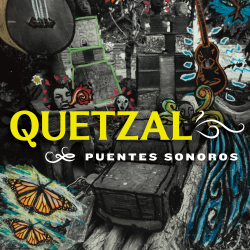Quetzal Announce Third Folkways Album, Puentes Sonoros (Sonic Bridges), out 2/12

On their third Smithsonian Folkways album, titled “Puentes Sonoros” (Sonic Bridges), Grammy-winning band Quetzal traverses past and present, rural and urban, Mexico and the United States. They draw from both their East L.A. rocker origins and their decades-deep engagement with the son jarocho, one of Mexico’s most prominent region-rooted folk musics, to establish their own voice of the here-and-now. The album, out February 12th, 2021, interlaces dreamlike audio memories of people, places, and experiences in the rural heartlands of Veracruz, Mexico, with a range of original creations—some reflective, some boisterous, and all a driving juggernaut of rhythmic forward motion.
Listen to Quetzal's 'El rio (The River)' HERE
And Pre-order the album HERE
“Puentes Sonoros” stays true to the essential sound of Quetzal, with string-rich jarana guitars providing a rhythmic-chordal musical heartbeat set over a baseline of innovative bass lines and undergirding melodies expressed in dynamic vocals, violin excursions, and plucked passages by the distinctive-sounding Veracruz guitarra de son. Add to this an armory of percussive punctuation in the form of foot-hammering zapateado, scraped and rattled quijada donkey jawbone, Veracruz pandero tambourine, and handclaps, and the Quetzal sound is complete. Collectively, the tracks present a tapestry of songs imbued with the sound and sentiment of Chicano inventiveness. While not a single track is itself a son jarocho, all are jarocho-inspired, adding new dimensions of sound and human experience to the centuries-old tradition.
Quetzal’s bandleader Quetzal Flores credits the group’s creativity to its style of collective composition, in which all members contribute. A Grammy-nominated producer as well as Grammy-winning artist, he is a founder and primal force behind the group’s sound, vision, and social message. In the 1990s, his attraction to the son jarocho melded his music-making with the binational jaranero movement, which continues to be as much a social movement championing disenfranchised people of the underclass (“los de abajo”) as it is a musical movement reinvigorating the tradition and propelling it to a prominent place throughout Mexico and in many parts of the United States.
Lead singer Martha González’s velvet hammer voice is likewise a stamp of the group’s identity. Equally comfortable in the modes of sweet, longing love and hard-hitting, unbridled songs demanding freedom and justice, González delivers the songs’ Spanish lyrics with convincing directness and a rich palette of emotional shades. On “Puentes Sonoros,” her voice alternates with that of veteran violinist Tylana Enomoto, who has come into her own as a silken-throated vocalist, and that of González’s musical prodigy and multi-instrumentalist son, Sandino Flores-González. An ensemble chorus lets its power be heard on Afro-tinged tracks such as “El Río” (The River) and “Te Quiero” (I Love You).
The music of Quetzal is at one with its quarter-century commitment to human dignity and justice. Leader Quetzal Flores co-founded the Big Frente Zapatista in 1997 and organized a retreat and community-building workshops in the heart of Zapatista territory in Chiapas, Mexico. There, he learned the method of collective songwriting, which in his words became a “signature pedagogy of the band Quetzal,” engaging community in “critical and creative conversation.” He joined the ranks of the jaranero movement and promoted the practice of the traditional Veracruz fandango dance event in East L.A., which for him was “a tangible method for me to be in community with music and in music with community.” With his partner Martha González he has promoted the notion of “artivista”—activism through artistic expression. He walks the walk as well as talks the talk of artivistic principles, founding the community-fortifying Seattle Fandango Project in 2008 and the annual FandangObon in 2013, bringing together L.A. Chicano, Japanese, and West African music and dance communities. In his role as Southern California Program Manager for the Alliance for California Traditional Arts (ACTA), he led a participatory cultural asset mapping project in Boyle Heights and the Eastern Coachella Valley in conjunction with the California Endowment’s Building Healthy Communities initiative. In 2014, he began curating ACTA’s statewide arts-in-corrections programs, offering a pathway to healing and rehabilitation for the incarcerated. Quetzal and the bandmembers see their music as “inseparable and symbiotic resources that live at the essence of community vitality and transformation,” and key to “cultural convening practices as sites for the facilitation of power and cooperation.”
With “Puentes Sonoros,” Quetzal’s unquenchable imagination and inexhaustible inventiveness open new avenues of creativity that bridge worlds of sound and worlds of commitment to a bright, just future.
For more information on Smithsonian Folkways, contact Shore Fire Media:
Mark Satlof | msatlof@shorefire.com | 718-522-7171
Hannah Schwartz | hschwartz@shorefire.com | 615-280-5330
